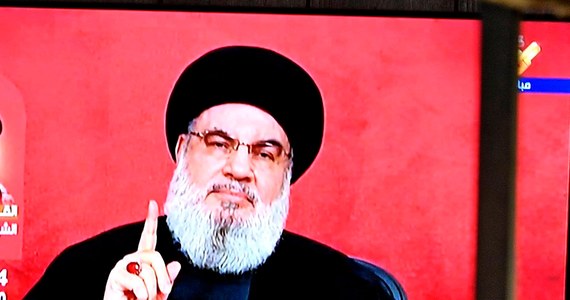The Lebanese terrorist organization Hezbollah confirmed the death of its leader Hasan Nasrallah. Nasrallah was killed on Friday evening in an Israeli attack on the Hezbollah headquarters in the southern suburbs of Beirut.
The group’s statement said that Nasrallah “joined the ranks of his martyred comrades, (…) whose march he led for nearly 30 years.” It stressed that the group would continue to fight against Israel to “support Gaza and Palestine and defend Lebanon and its steadfast, honorable people.”
As Reuters reported after 3 p.m., after announcing the death of its leader, Hezbollah fired a rocket towards Israel.
Hassan Nasrallah was born on August 31, 1960 in Beirut.
He has been the leader of the Hezbollah organization (the name means “Party of God” in Arabic) since 1992.
As he said in November 2023, after the Hamas terrorist attack on Israel, this “decision was right, wise and brave.” He stated that the fact that the operation was “kept secret from the ‘axis of resistance'” and “no one knew about it” proves that “this battle is exclusively Palestinian in nature.”
Iran’s Supreme Spiritual and Political Leader Ayatollah Ali Khamenei called on Muslims to “stand shoulder to shoulder with the people of Lebanon and the proud Hezbollah and help them in every possible way to oppose the vile regime” of Israel.
Khamenei published this statement after the Israeli army announced the killing of Hasan Nasrallah.
“The fate of this regime will be decided by force and resistance, and Hezbollah will lead them,” Khamenei said.
Iran is in constant contact with the Shiite terrorist organization Hezbollah in Lebanon and other groups supported by Tehran to determine next steps after Israel reported the killing of Hasan Nasrallah, two Iranian regional officials with information on the matter told Reuters this morning. received from the authorities in Tehran.
Iran’s supreme spiritual and political leader, Ayatollah Ali Khamenei, was transported to a safe place inside the country, where increased security measures have been introduced.
Middle East analyst Jarosław Kociszewski, commenting on the death of the leader of the Lebanese terrorist group, stated that “Israel will not wait for Hezbollah’s reaction, but will do its own thing and uses its initiative and advantage to achieve its goal.” And this goal is to dismantle the military structures of Hezbollah, he added.
The Israelis carried out a “decapitation” of Hezbollah – in recent days, every single one of the members of the military leadership of this organization have died, Kociszewski notes. As he predicts, Israel will now “liquidate its subsequent layers.”
When asked about a possible land offensive of the Israeli armed forces, the analyst replies: We don’t know that, but we know that (the Israelis) are ready for it and if such a decision is made, it will be a matter of a few hours. However, on the other hand, it is also known that it is easier to get in than to get out.
Hezbollah’s reaction remains unknown, he emphasizes. At the moment it does not respond in a meaningful and organized way. Firing Israel using 200-300 rockets is not a large number compared to previous estimates that Hezbollah is capable of firing several thousand missiles a day. However, this is not happening, he notes.
As he says, two explanations are possible. The first is that Hezbollah has been hit so severely that it is unable to respond with large-scale, organized attacks. The second is that Hezbollah is waiting for something, but in this situation it is difficult to understand what, since it is receiving such fundamental blows, says Kociszewski.
We are in a dynamic moment in which this war is heating up, so we can only ask more questions. One of them is: whether and how quickly Hezbollah is able to rebuild its structures and chain of command in order to respond militarily. The next question concerns Iran, which finds itself in a very difficult situation. Its most important proxy (intermediary – editor’s note) is being crushed to pieces – says the expert, recalling that “Iran’s security was based on a network of (…) intermediaries in the region, and Hezbollah is the most important of them.”
On the night from Friday to Saturday, the Israeli army announced that it was conducting further “precise attacks” on the southern suburbs of the Lebanese capital, aimed at Hezbollah. The military had earlier warned civilians to evacuate three areas of Beirut.
On Friday, Israel also attacked Hezbollah’s headquarters. As Reuters reported at the time, further explosions were heard in Beirut.
The Iranian Foreign Ministry then stated that the Israeli airstrike on the capital of Lebanon was a war crime for which Israel and the US should be held responsible.
Israeli Defense Forces spokesman Cadm. Daniel Hagari earlier warned that “the army will soon strike Hezbollah’s underground installations in Dahije,” a southern district of Beirut. He added that the airstrikes would target “three strategic underground Hezbollah facilities in the heart of Dahiye.”


